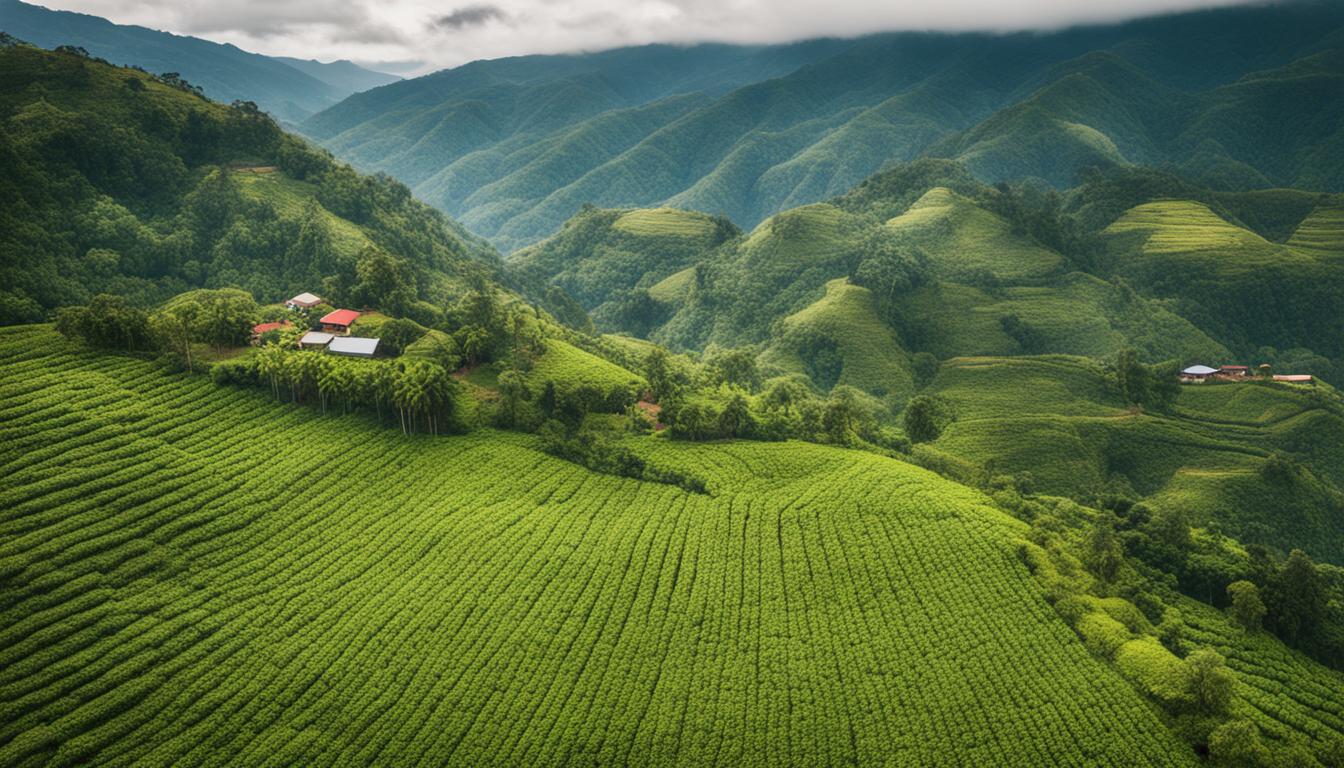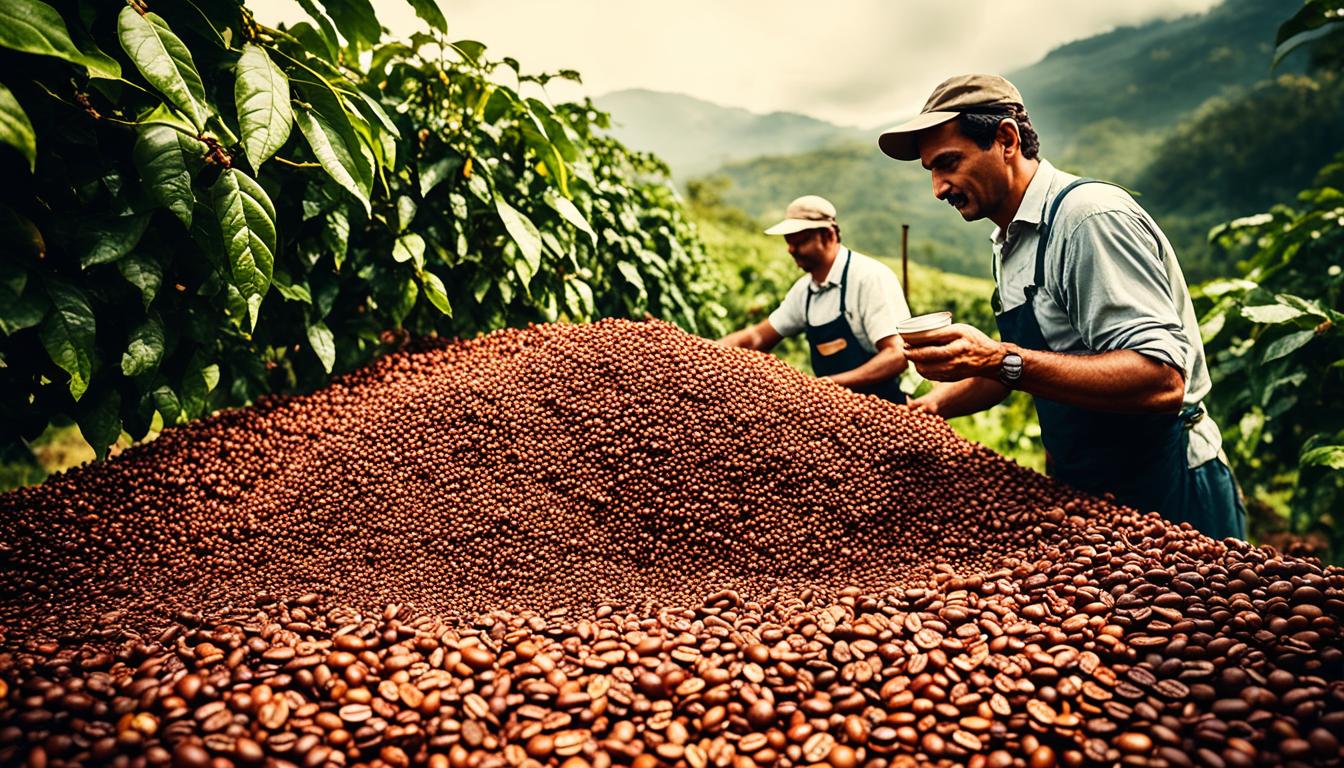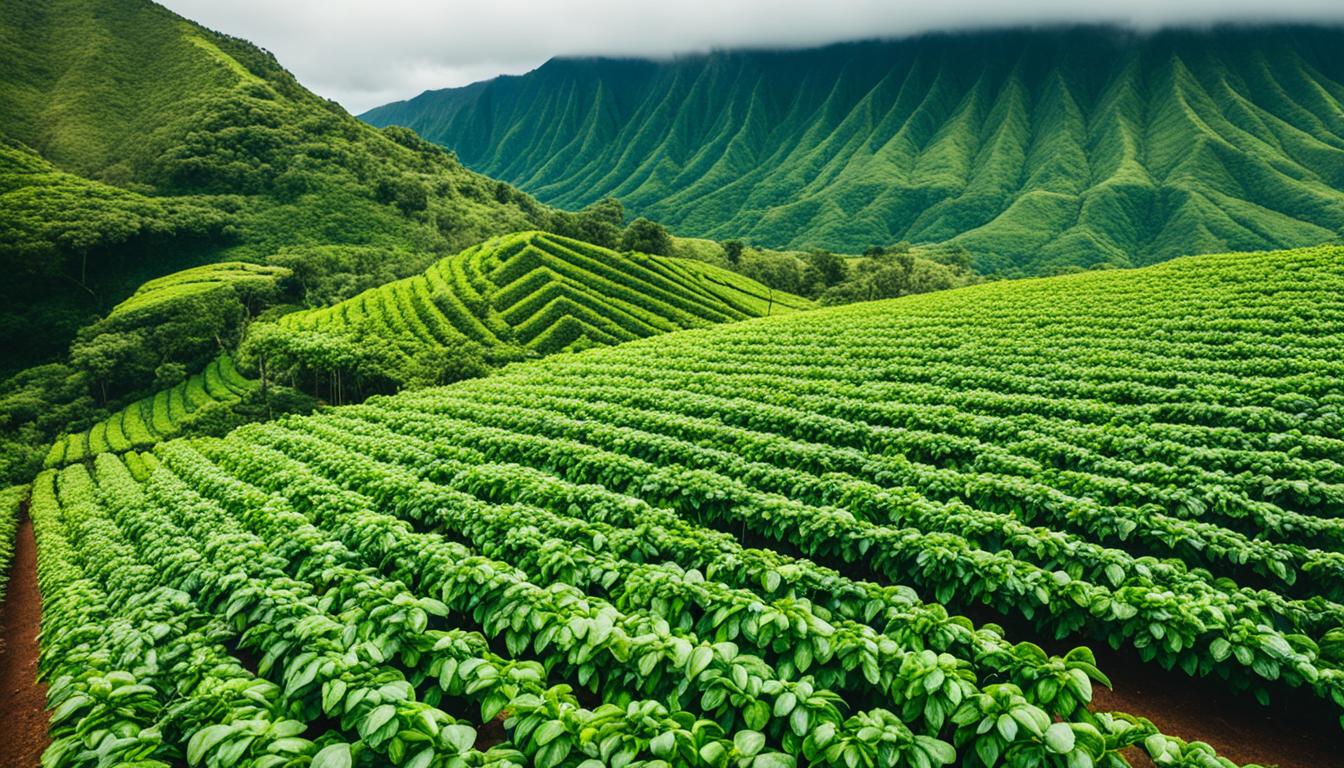Welcome to our journey through the captivating world of Colombian coffee farms. In this article, we will delve into the fascinating history, unique flavors, cultural significance, and sustainable practices of the Colombian coffee industry. Join us as we uncover the secrets behind some of the best coffee estates in the world and discover why Colombian coffee is renowned for its high-quality Arabica beans and authentic taste.
Key Takeaways:
- Colombian coffee farms are known for producing premium Arabica beans and adopting sustainable farming practices.
- Colombian coffee offers a unique flavor profile influenced by the country’s diverse climate and geography.
- Coffee plays a symbolic role in Colombian culture, representing national pride and cultural identity.
- Colombia’s commitment to quality and consistency has made it a leading global coffee producer.
- The future of Colombian coffee lies in ongoing innovations and the cultivation of specialty coffees.
The Unique Flavors of Colombian Coffee
Colombian coffee offers a sensory experience like no other. The coffee’s unique flavor profile is influenced by Colombia’s diverse climate and geography. Grown at high altitudes, the beans develop rich flavors. Each region imparts its own distinct characteristics to the coffee, from the caramel sweetness of Huila beans to the fruity notes of coffee from Nariño. Colombian coffee is often described as the most well-balanced coffee in the world, with a harmonious blend of sweetness, bitterness, and acidity.
| Region | Flavor Profile |
|---|---|
| Huila | Caramel sweetness with a hint of chocolate |
| Nariño | Bright acidity with fruity notes of blackberry and citrus |
| Tolima | Medium body with a nutty undertone |
| Antioquia | Balanced acidity with floral and caramel notes |
Coffee’s Symbolic Importance in Colombian Culture
In Colombia, coffee is more than just a beverage. It is a symbol of national pride and cultural identity. The image of the coffee farmer, or ‘campesino’, dressed in traditional attire, represents the hard work and dedication of the Colombian people.
“Colombian coffee is not just a cup of coffee; it is a representation of our cultural heritage and the values we hold dear.”
The cultural significance of coffee in Colombia is celebrated through festivals and traditions that highlight the country’s connection with its coffee culture. One such notable event is the National Coffee Festival, held annually in Manizales. This vibrant festival showcases colorful parades, music, dancing, and, of course, a wide array of coffee tasting experiences.
The National Coffee Festival brings together coffee enthusiasts from all over the world, providing a platform to celebrate the craftsmanship of Colombian coffee and the rich cultural traditions that surround it. It serves as a reminder of the bond between Colombian coffee and its people.
Honoring Heritage: Cultural Traditions and Coffee
Colombian coffee culture is deeply intertwined with local customs and traditions. From the cultivation and harvesting of coffee beans to the brewing and serving rituals, each step reflects the cultural identity of the Colombian people.
- The traditional clothing worn by coffee farmers pays homage to their heritage and connection to the land.
- Special ceremonies and rituals are performed to honor the role of coffee in Colombian society.
- Art, music, and dance often depict coffee themes, showcasing the cultural significance of the beverage.
The representation of coffee in various aspects of Colombian culture is a testament to its importance and influence on the country’s way of life.
Coffee: A Catalyst for Social Connections
Coffee plays a pivotal role in social interactions and fostering connections in Colombian communities. It is a catalyst for conversations, bringing people together to share stories, ideas, and experiences.
“Sitting down for a cup of coffee is not just about drinking; it’s about connecting with others, building relationships, and strengthening our sense of community.”
Colombians take pride in their coffee and use it as a means to create lasting bonds with their loved ones, friends, and even strangers. Coffee serves as a bridge that transcends social barriers, facilitating open conversations and fostering a sense of unity among individuals.
The cultural significance of coffee in Colombia is deeply ingrained in the fabric of society, forming an integral part of the country’s cultural identity.
Colombia’s Rise as a Global Coffee Producer
Colombia has emerged as one of the world’s leading coffee producers, renowned for its exceptional quality and consistency in coffee production. Despite facing challenges such as political strife and natural disasters, Colombian coffee growers have shown resilience and dedication, maintaining their position in international markets. Their commitment to sustainable coffee production has also contributed to the industry’s success and positive impact on the environment.
The Colombian coffee industry’s rise to prominence can be attributed to the country’s ideal coffee-growing conditions, including favorable climate and rich soil. These factors, combined with the expertise and experience of Colombian farmers, have resulted in the production of high-quality Arabica coffee beans that are sought after by coffee connoisseurs worldwide.
Colombian coffee’s popularity in international markets can be attributed not only to its exceptional taste but also to the industry’s commitment to maintaining consistent quality standards. Colombian coffee growers adhere to rigorous quality control measures throughout the production process, ensuring that every cup of Colombian coffee delivers a delightful and consistent flavor profile.
Sustainability is a core principle in Colombia’s coffee production. Colombian coffee growers recognize the importance of protecting the environment and implementing sustainable farming practices. By prioritizing sustainability, they ensure the longevity of their coffee farms and contribute positively to the global coffee industry’s environmental impact.
In summary, Colombia’s rise as a global coffee producer is a testament to the country’s commitment to producing high-quality coffee, maintaining consistency, and promoting sustainability. Colombian coffee has captured the hearts of coffee enthusiasts worldwide, and its reputation as a premier coffee origin continues to grow. As Colombian coffee continues to flourish, coffee lovers can look forward to enjoying the finest and most sustainable coffee beans that Colombia has to offer.
Innovations and the Future of Colombian Coffee
At the heart of Colombian coffee lies a spirit of innovation that drives us forward. We understand the importance of adapting to changing climates and market demands. That’s why Colombian coffee growers are constantly experimenting with new cultivation techniques and coffee varieties to ensure a vibrant future for Colombian coffee.
One of our most significant breakthroughs has been our seamless integration into the global specialty coffee movement. We take pride in producing exceptional single-origin and specialty coffees that highlight the distinct flavors and characteristics of different regions.
“Our commitment to specialty coffee has solidified Colombian coffee’s position as a global leader. We strive to offer coffee connoisseurs unique flavor profiles that transport them to the lush coffee farms of Colombia with every sip.”
Colombian coffee’s future is bright, fueled by our relentless pursuit of excellence. By embracing innovation and expanding our specialty coffee offerings, we ensure that Colombian coffee remains at the forefront of the industry.
To showcase the incredible diversity within Colombian coffee, here’s an overview of the fascinating flavor profiles you can expect from different regions:
| Region | Flavor Profile |
|---|---|
| Huila | Rich caramel sweetness with hints of chocolate |
| Nariño | Bright and fruity with notes of citrus and berries |
| Tolima | Floral and delicate with a subtle honey sweetness |
| Quindio | Smooth and balanced, with nutty undertones |
These complex flavors are the result of our unwavering dedication to quality and passion for innovation. By exploring new cultivation techniques and investing in our farmers, we ensure that Colombian coffee continues to captivate the palates of coffee enthusiasts around the world.
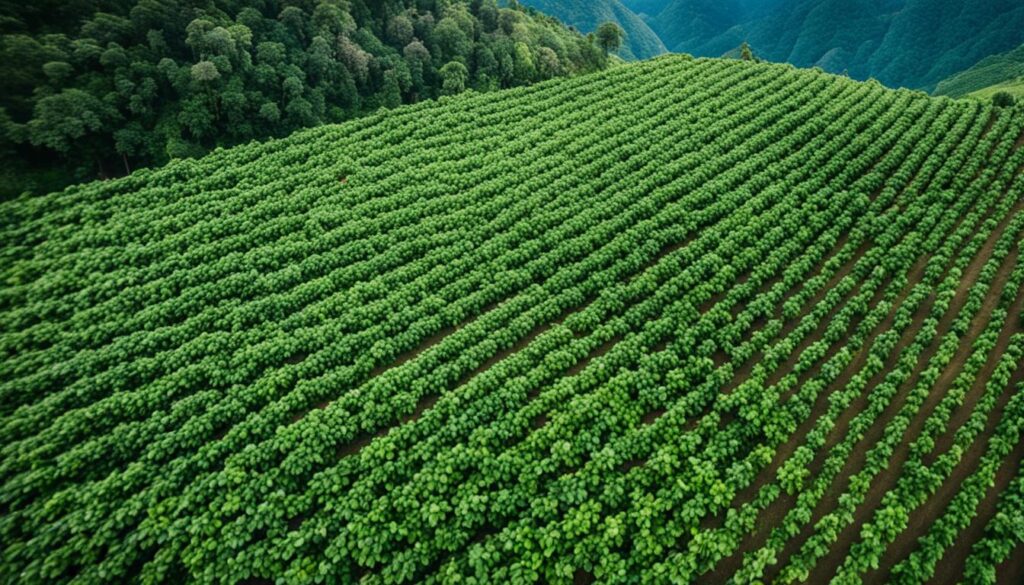
The History and Evolution of Colombian Coffee
The history of Colombian coffee dates back to the 18th century when coffee plants were first introduced to the country. This marked the beginning of a significant evolution in the Colombian coffee industry, shaping it into what it is today. Commercial coffee plantations were established in the early 1800s, and the industry quickly gained momentum, becoming a vital contributor to the Colombian economy.
One of the most significant milestones in the evolution of Colombian coffee was the shift to growing Arabica coffee in the 1800s. Arabica coffee beans are known for their superior quality and delightful flavors, which catapulted Colombian coffee to global recognition.
An essential entity in the Colombian coffee industry is the National Federation of Coffee Growers, established in 1927. The Federation played a crucial role in promoting and supporting Colombian coffee, setting industry standards, and marketing Colombian coffee globally. Through the Federation’s efforts, Colombian coffee gained a strong foothold in the international market, solidifying its reputation as one of the finest coffees in the world.
“The National Federation of Coffee Growers has been instrumental in ensuring the excellence and success of Colombian coffee. With their dedication to quality and their commitment to promoting sustainable coffee production, Colombian coffee has flourished on both domestic and global fronts.” – Juan Valdez, Colombian coffee grower
Today, Colombian coffee stands as a testament to the rich history and evolution of the industry. It represents a perfect blend of tradition and innovation, with generations of skilled coffee growers contributing to its success. With its unique flavor profiles, commitment to sustainability, and ongoing efforts to improve cultivation techniques, Colombian coffee continues to captivate coffee enthusiasts around the world.
Influence of Arabica Coffee on Colombian Coffee Industry
The introduction and cultivation of Arabica coffee in Colombia revolutionized the coffee industry. Arabica coffee beans are known for their rich flavors, delicate acidity, and exceptional aroma. These characteristics became central to Colombian coffee’s reputation for excellence, and it quickly gained recognition as one of the finest coffees in the world. The high altitudes and diverse climates of Colombian coffee regions provide optimal conditions for growing Arabica coffee, resulting in a coffee that is highly prized and sought after.
| Colombian Coffee Facts | |
|---|---|
| First Introduction of Coffee Plants to Colombia | 18th century |
| Establishment of Commercial Coffee Plantations | Early 1800s |
| Shift to Growing Arabica Coffee | 1800s |
| Founding of National Federation of Coffee Growers | 1927 |
As Colombian coffee continues to thrive, it showcases the importance of preserving its rich history and traditions while embracing innovation and sustainable practices. The Colombian coffee industry, spearheaded by the National Federation of Coffee Growers, remains committed to delivering exceptional coffee to enthusiasts worldwide.
The Process of Growing and Harvesting Colombian Coffee
Colombian coffee cultivation techniques encompass various methods that prioritize sustainability and the production of high-quality beans. Two common practices utilized in Colombian coffee farms are shade-grown farming and organic farming.
Shade-grown farming involves cultivating coffee plants under the canopy of trees, providing natural shade and protecting the coffee cherries from harsh sunlight. This technique not only preserves the delicate flavor profiles but also supports biodiversity, benefiting both the environment and the coffee plants.
Organic farming in Colombian coffee farms eliminates the use of synthetic fertilizers, pesticides, and herbicides. Instead, natural alternatives like compost and organic matter nourish the soil, promoting healthier coffee plants and preserving the ecosystem.
The next step in the process is selective picking, where only the ripest coffee cherries are carefully handpicked by skilled farmers. This meticulous approach ensures that only the highest-quality cherries are harvested, enhancing the overall flavor and aroma of the coffee beans.
Once harvested, the coffee cherries undergo traditional coffee processing to achieve the desired flavors and characteristics. The process starts with pulping, where the outer skin of the cherries is removed, revealing the parchment layer and the two coffee beans within. The beans, still covered in the sweet, sticky mucilage, are then subject to fermentation, a vital step that allows enzymes to break down the mucilage, enhancing the coffee’s taste.
After fermentation, the coffee beans are washed to remove any remaining mucilage and impurities. The beans are then carefully dried to reach the optimal moisture content, a crucial factor that affects the quality of the coffee. This can be done by sun-drying the beans on patios or using mechanical dryers.
The final result of this meticulous process is a batch of exceptional Colombian coffee beans that carry the rich flavors and aromas the region is renowned for.
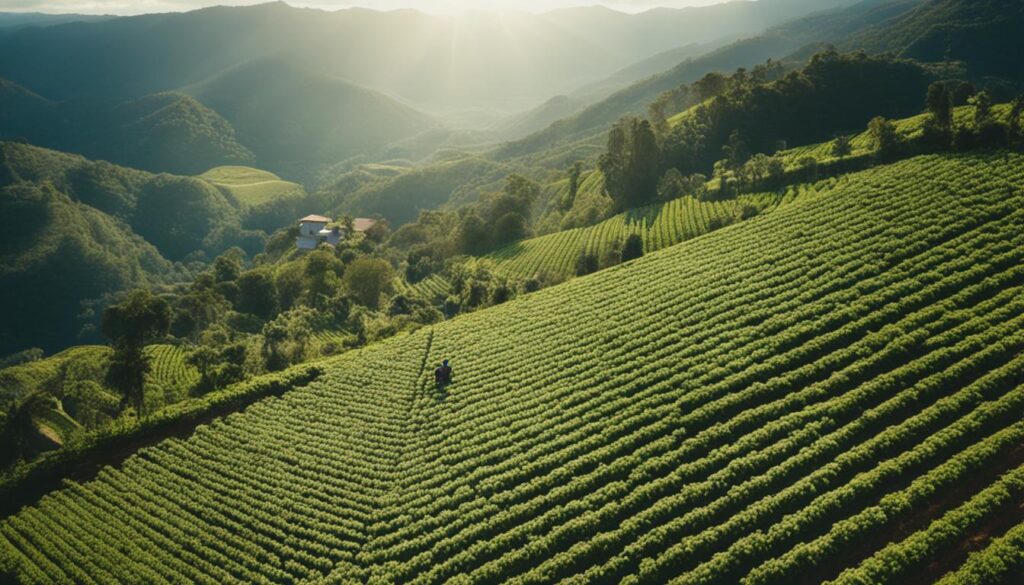
Now that we have explored the intricate process of growing and harvesting Colombian coffee, we can truly appreciate the craftsmanship and dedication that goes into each cup of this prized beverage.
Conclusion
Colombian coffee is more than just a beverage; it is a journey through the heart and soul of Colombia. From the lush coffee farms to the cup of aromatic bliss, Colombian coffee culture embraces history, tradition, and a commitment to excellence. As we explore the unique flavors and sustainable farming practices, we can truly appreciate the cultural significance of Colombian coffee.
Looking toward the future, Colombian coffee is poised for continued success and innovation. With advancements in cultivation techniques and the growing popularity of specialty coffees, the future of Colombian coffee is bright. As coffee lovers around the world yearn for authentic experiences and exceptional quality, Colombian coffee will always satisfy their cravings.
Join us on a coffee journey like no other, where every sip tells a story of Colombian coffee farms, the rich flavors, and the steadfast dedication of the people behind it. Let Colombian coffee culture inspire you and discover a world where passion and flavor unite. We invite you to savor the history, embrace the present, and anticipate the promising future of Colombian coffee.
FAQ
What makes Colombian coffee farms unique?
Colombian coffee farms are known for their premium Arabica beans and sustainable farming practices, making them some of the best coffee estates in the world.
What are the flavor profiles of Colombian coffee?
Colombian coffee offers a well-balanced flavor with a harmonious blend of sweetness, bitterness, and acidity. Each region imparts its own distinct characteristics, from the caramel sweetness of Huila beans to the fruity notes of coffee from Nariño.
How does coffee play a role in Colombian culture?
Coffee is not just a beverage in Colombia; it is a symbol of national pride and cultural identity. The image of the coffee farmer represents the hard work and dedication of the Colombian people. Celebrations and traditions, such as the National Coffee Festival, showcase the deep connection between Colombia and its coffee culture.
What is the significance of Colombian coffee in the global market?
Colombia is one of the leading coffee producers in the world, known for its high-quality and consistent coffee. Despite facing challenges, Colombian coffee growers have maintained their position in international markets. There is also a strong emphasis on sustainability in Colombian coffee production.
How is Colombian coffee evolving and innovating?
Colombian coffee growers are continuously experimenting with new cultivation techniques and coffee varieties to adapt to changing climates and market demands. The country has embraced the specialty coffee movement, focusing on producing single-origin and specialty coffees that highlight the unique flavors and characteristics of different regions.
What is the history of Colombian coffee?
Colombian coffee began in the 18th century with the introduction of coffee plants. Commercial coffee plantations were established in the early 1800s, revolutionizing the industry. The National Federation of Coffee Growers, established in 1927, played a key role in promoting and supporting Colombian coffee globally.
What are the techniques used to grow and harvest Colombian coffee?
Colombian coffee is grown using various techniques, including shade-grown farming and organic farming. Selective picking ensures that only ripe cherries are harvested, maximizing the quality of the beans. The traditional coffee processing method involves pulping, fermentation, washing, and drying to achieve the desired flavors and characteristics.
What is the conclusion about Colombian coffee?
Colombian coffee showcases the rich history, diverse flavors, and commitment to quality. It is a sensory experience that reflects Colombian culture, traditions, and dedication to excellence. With continuous innovations and a focus on sustainability, the future of Colombian coffee is bright.

